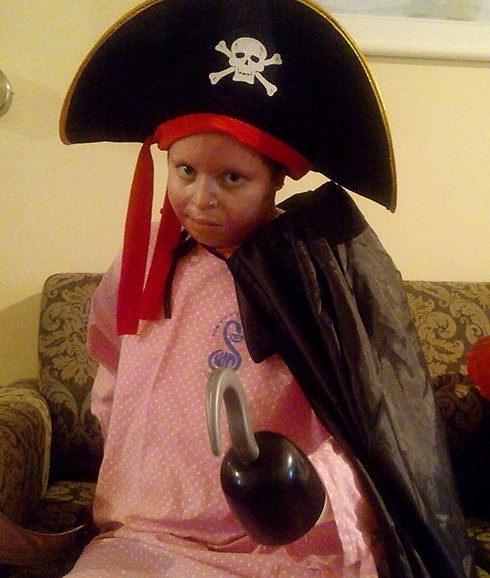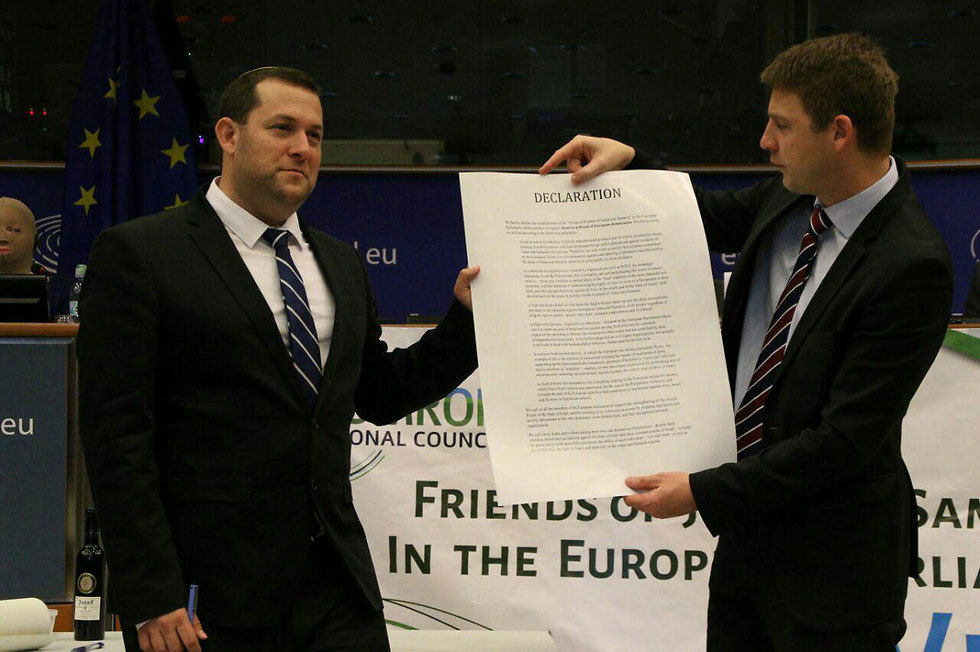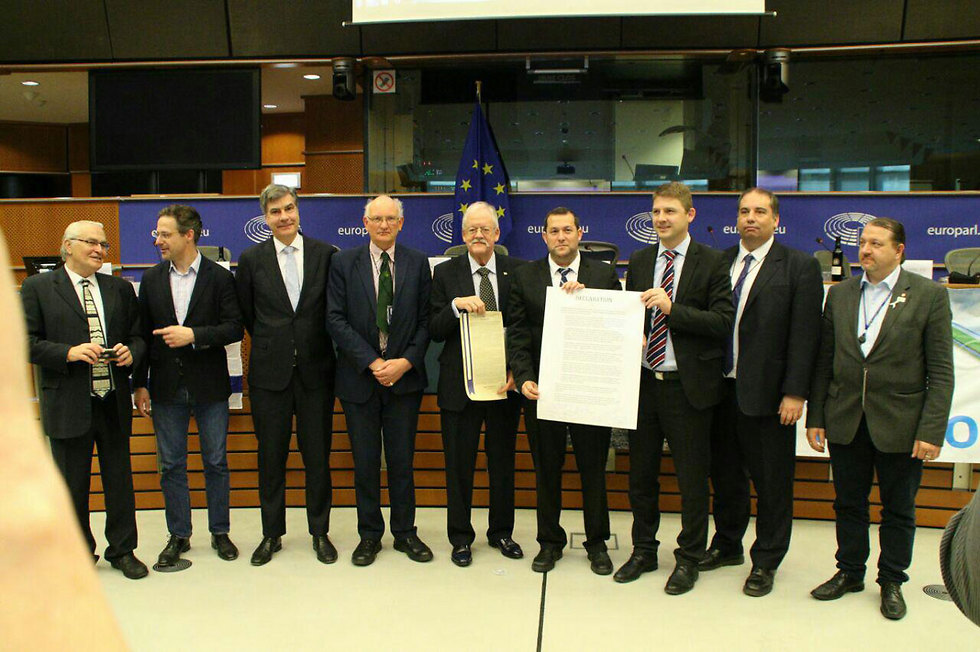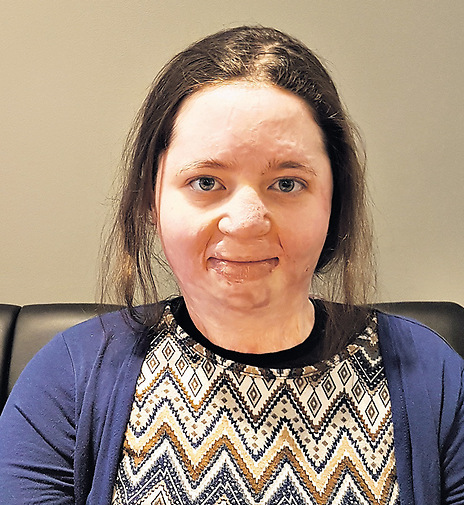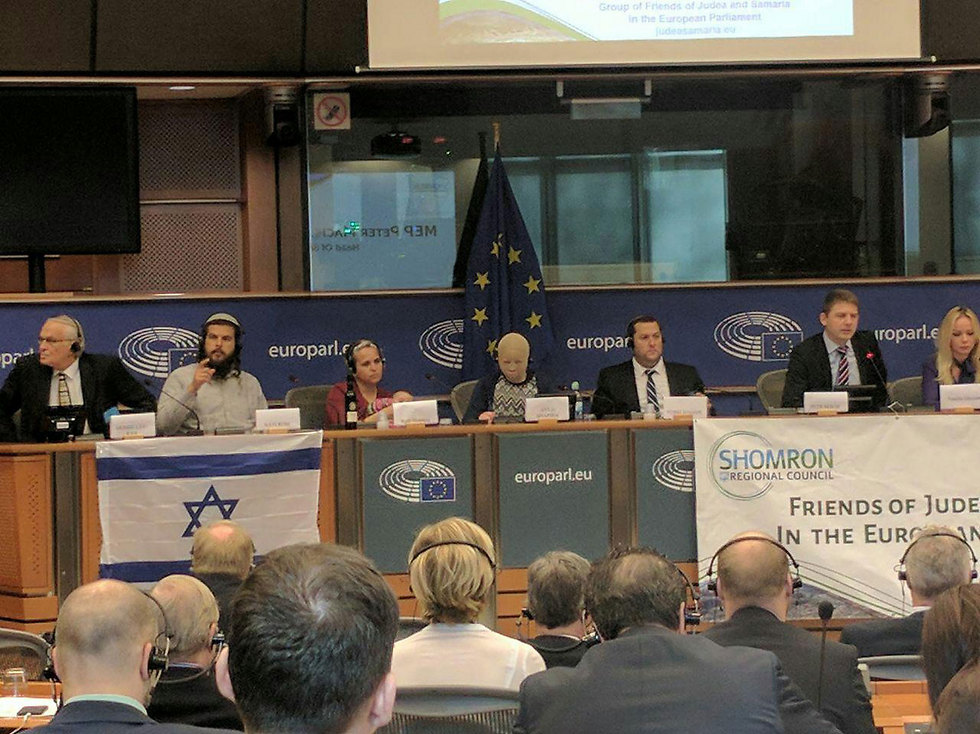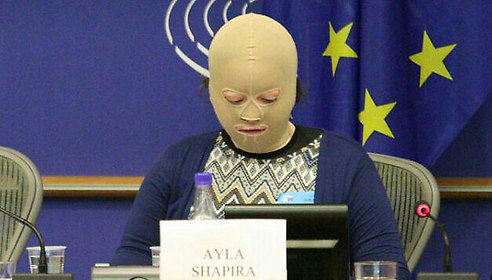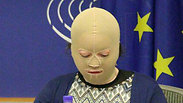
'The most worthwhile job in the PA is to murder a Jew'
Ayla Shapira suffered burns all over her face and arms when a Palestinian teen threw a Molotov cocktail at the car she was traveling in when she was just 11. Almost 14 now, she went to Brussels to tell her story at the European Parliament and warn MEPs their aid money is not going to peaceful purposes: A Palestinian teacher makes $250 a month, a terrorist gets $3,300.
Ayla Shapira communicates with her eyes. Green eyes that stand out from behind a pressure mask, which covers her face during almost all hours of the day to protect her scarred skin. These eyes only rarely express anger or hatred. Surprisingly, most of the time, they radiate happiness.
There's great joy in Ayla's eyes as she embraces her younger sister Esther, nine months old, who came on this trip to the European Union headquarters in Brussels with Ayla and their mother Ruth because she's still breastfeeding.
These same eyes expressed indifference when I asked her if she had any interest in meeting the Palestinian teen from the village of Azzun who threw the Molotov cocktail that hit the car she was traveling in with her father.
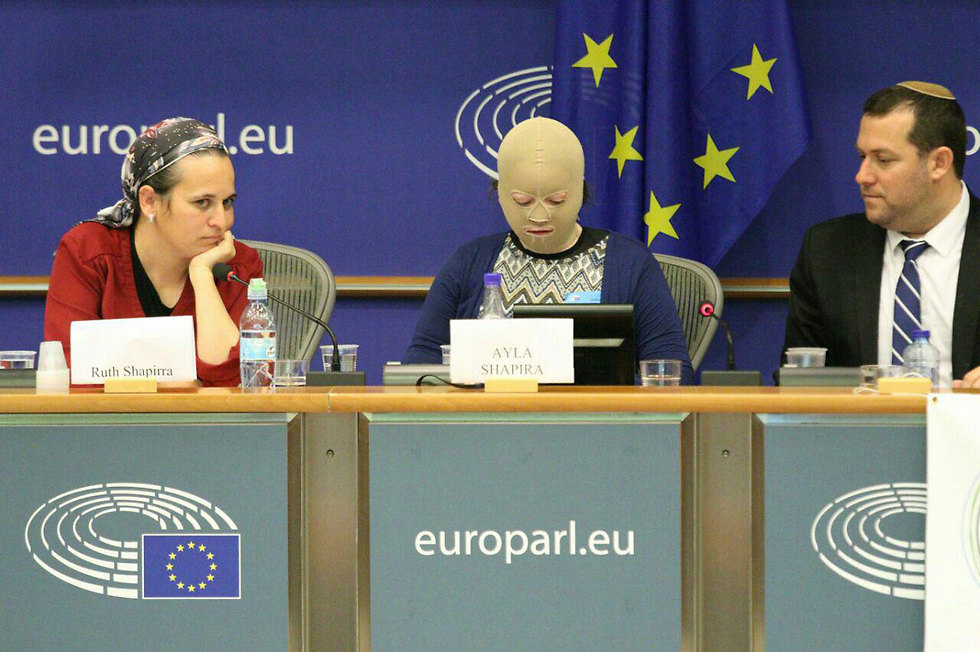
"You were great," I say as I hug her.
"But I got some words wrong," she says in a tone of self-flagellation.
"That's okay," her mother says soothingly. "No one expected you to have perfect English. Everyone knows English is not your mother tongue, and that you're just a young girl."
But Shapira, a resident of Ma'ale Shomron, who will turn 14 in three months, is not "just" anything. Even her hobbies are different to those of her peers. She listens to Israeli music of the older generation, like Kaveret and Arik Einstein, and she's a self-declared bookworm.
"When I was six, I hated reading. But after a year I read Harry Potter and I got the reading bug," she says, showing off the five books she bought at Ben-Gurion Airport before boarding the flight to Brussels.
On a regular week, she reads 5-7 books and her mother, unlike most mothers, doesn't need to beg her to spend less time in front of the TV screen. There's no television in their home.
Ayla's mother, Ruth, does have to gently remind her that "we don't have to buy so many books. You can get books from the library."
"No library has enough books for me," she grunts from under her mask. "And I buy these with my own money. I have some left from my Bat Mitzvah party and I earn money, too."
Doing what?
"During Purim, I drew on children's faces. Five shekels per face. And I also babysit. Here, in the Samaria, there's a set payment policy. The age of the sitter is how much she makes for an hour of work. So I get NIS 13 per hour, but in three months my going rate will increase."
There was a lot of talk of the "going rate" during the special European Parliament meeting, which was held as a show of support and solidarity with Judea and Samaria.
A year and a half ago, the meeting's organizer MEP Petr Mach from the Czech Republic arrived in Israel as a guest of Yossi Dagan, the head of the Samaria Regional Council. Dagan has already served as guide for some 400,000 visitors from across the globe, including hundreds of VIPs, who wanted to see with their own eyes why the territories are so vital to Israel's security, as Dagan claims.
Mach, an energized young MEP, came, saw, was convinced and enchanted. For over a year, he worked hard to establish the Friends of Judea and Samaria in the European Parliament. The intergroup was inaugurated last week with a joint declaration promising to cooperate to stop the funding of terrorism and reduce trade barriers facing Jewish pioneers in Judea and Samaria.
A terrorist makes more than a teacher
Dagan, 36, came to the Samaria region 22 years ago. "When I was in the 7th grade, I was standing at the main junction in Pardes Katz holding up signs against the Oslo Accords when my parents reached the conclusion it wasn't enough to just protest. We needed to strengthen the Land of Israel with actions, so we moved there," Dagan says.
"The expulsion from Gush Katif was for me a lesson at the university of life. I learned that we must increase the settlement numbers and that I was willing to do anything to achieve that: from being an activist in the Trump campaign (in Israel) to sleeping on the sidewalk outside the Prime Minister's Residence for two weeks after the murder of the Henkin couple. We're among the leading areas in population growth in Israel—an increase of 8-10 percent a year. If we were allowed to build, we'd reach 30 percent a year. The demand is massive and it far surpasses the supply.
"I also learned that the greatest enemy of the State of Israel as a whole, and particularly of Judea and Samaria, were not the Palestinians and Hamas, but ignorance. The same ignorance they have in Geneva about (the settlement) Itamar, they also have concerning Herzliya or the IDF. Only those who came here and see the Biblical sites understand this isn't an occupation, and they see things in a realistic manner."
During his speech at the European Parliament, Dagan explained to his audience that Israel is only 70 kilometers wide between the Mediterranean Sea and the Jordan River, and that Judea and Samaria make up 55 kilometers of this narrow stretch of land. Without that area, Israel would be a mere 15 kilometers wide.
"You can laugh with disbelief," he said politely. "I know it sounds unrealistic. It's like the distance from the Brussels Airport to the city center—but that's reality."
The looks of surprise on his listeners' faces were replaced by shock when Dagan told them about the "going rate" in the Palestinian Authority. On the podium he did so briefly, but later, in an interview with Yedioth Ahronoth, he expanded on those numbers.
"A teacher in the Palestinian Authority makes NIS 900 ($250) a month, while a laborer makes NIS 1,500 ($415) a month and a Palestinian who murdered a Jew and was sentenced to life in prison gets a monthly salary of NIS 12,000 ($3,300) from the PA. When that murderer is released in some (prisoner swap) deal, he gets a pension similar to that of a major general in the military for the rest of his life. A 15-year-old terrorist will get a general's pension because he murdered a Jew," Dagan says.
"I understand," Ayla says. "The most worthwhile profession in the PA is to murder a Jew. Just as I said in my speech: The one who threw the Molotov cocktail (that hit my car) was a 16-year-old boy who wanted to ensure his family's livelihood."
According to Dagan, the European Union transfers some $500 million of taxpayer money a year to the Palestinian Authority. Out of this fortune, the PA allocates $144 million a year to the salaries for terrorists imprisoned in Israel.
Shapira spoke to the MEPs from behind her mask, at eye level. "I want you to remember that sometimes when you think you're contributing to peaceful purposes, you are actually contributing to war," she told them as a screen behind her showed one of her drawings: A dove of peace holding a Molotov cocktail.
Ayla's mother, Ruth, says two terrorists were behind the attack that hurt her daughter, one of them a minor.
"I got a call from the military prosecution saying the minor was offered a plea: 12.5 years in prison and having to pay NIS 25,000 in compensation. I didn't know whether to laugh or cry," she recounts. "I told them this was a ridiculous sum that wouldn't even cover a week of Ayla's treatment. I told them I thought the minor terrorist would not take the plea, and I was right. He refused because he wanted to get the monthly salary. Because he failed in murdering Ayla, he's only making NIS 7,000-8,000 ($1,900-$2,200) a month. He was eventually sentenced to 14.5 years in prison."
And do you think that's enough?
"What I think doesn't matter," Ruth responds. "Had they sentenced him to longer, he would have made a lot more money. According to the PA's going rate, if you get over 15 years, there's a significant hike in pay."
"I'm sure the judge knew that," Ayla adds.
Speech instead of anniversary
After the speech, as the excitement begins to fizzle out, we go to a vegetarian restaurant that many kippa-wearing people are flocking to, alongside some wearing baseball caps, afraid of drawing unwanted attention.
The inauguration ceremony for the Judea and Samaria intergroup was postponed several times until Dagan and his advisor Chen Ben-Lulu, who is responsible for the Samaria Regional Council's foreign ties, were able to gather enough donations to fund it. It was only when we landed in Brussels that we learned the delay was for the best: This special event took place exactly a year following the deadly terror attack that horrified the Belgians.
When we're at the restaurant, Ayla removes the pressure mask from her face, as it makes it hard for her to eat. "I don't mind people seeing me as I am," she says. The mask made the flight to Brussels hot and stifling for her.
This is the first time in her life that she goes on a plane. "According to Halacha (Jewish law)," she says, "a Jew should not leave the Land of Israel unless he has a good reason, such as health or livelihood. A vacation abroad, according to the Halacha, is not a good enough reason. My father always says: 'We're not traveling abroad because we already made it.' But the invitation to speak at the European Union was a good reason. I hope I was able to describe to them the kind of reality we live in. Look at me and understand I'm not the only one who looks like this. There are many others like me."
It's only when they get to the hotel—after baby Esther falls asleep in her crib—that Ayla and Ruth truly relax. Ruth, 36, removes the headscarf she's been wearing every day for 15 years, since she married Avner. They are marking their anniversary this week, but she decided to forego the celebrations this year so she could come to Brussels and speak alongside her daughter.
Before she got married, Ruth studied criminology at Bar-Ilan University. But since she had Ayla, she has been a full-time housewife and a mother of six daughters: Ayla, 12-year-old Yiska, nine-year-old Tirzah, three-year-old Naomi and baby Esther.
On that fateful Thursday, December 25, 2014, Ayla was on her way back home with her father Avner from an advanced math class for gifted students in Kfar Saba.
Her father was driving on the road leading to the El Matan neighborhood, where the family resides, with Ayla sitting next to him in the passenger seat.
"All of a sudden I saw a ball of fire coming from above. It shattered the window—I don't remember if it was the windshield or the car window—and landed between dad and me," she recounts. "Within seconds, my entire field of view was filled with flames. All I could see was yellow and orange. But I didn't feel any pain. Later, it was explained to me that the adrenaline neutralized the pain. I didn't feel anything; I was just thinking with cold logic what I had to do to get out of the car.
"I unbuckled my seat belt. It took a while. I tried to open it with my left hand but I couldn't, because it was already burned. So I used my right hand and that's how it, too, got burned. After that I tried to open the locked door and it didn't work.
"The doctors who treated me said I wasn't in the car for more than 10 seconds, but it's amazing to me to think of how many thoughts went through my mind in those 10 seconds. I was asking myself how I was going to get out of the car if its locking mechanism was melting.
"My dad came out of his side to call for help, but he didn't turn off the engine. When he saw I couldn't get out, he came back to the car, turned off the engine, and only then did I manage to get out. By myself."
Ruth was home making dinner when Avner called to tell her, "A Molotov cocktail was thrown at us, but it's not like your incident." Two weeks earlier, on the very same road, a Molotov cocktail was thrown at Ruth's car and only miraculously missed the windshield, while the massive rock that was thrown at the car shattered the rear windshield and landed in the trunk.
Ruth, after learning from her own experience, called the main emergency center and asked to be transferred to the regional center in the Samaria, so her husband and daughter wouldn't have to wait for help for half an hour, like she did.
"There's a recording making the rounds online of the emergency call," Ayla says with derision. "The emergency call center asked my dad what the situation was and he answered 'We have a lot of serious burns.' They asked him who he was with and dad answered, 'with my daughter.' Later you can hear him tell me to 'Keep walking.' Dad and I realized it was too dangerous to stay there, because if there were terrorists on the hill, what was going to stop them from coming down and killing us? We walked for 800 meters, until we got home."
"I'm tired of everyone thinking dad carried me in his arms!" she adds vehemently. "I have no idea how that story started. So please write that I was walking on my own. I didn't have burns on my legs, but while I was walking I started feeling pain, and I was feeling a terrible shortness of breath."
"It was only after I got off the phone with Avner that I realized I didn't know what Ayla's condition was," Ruth says. "When they got home, I told Avner 'Your shirt is on fire,' and he said, 'Forget that, take care of Ayla.' I brought her into the house and she looked terrible. She didn't have any eyebrows or eyelashes, she was bleeding from just about everywhere—from her nose, mouth, ears and eyes. Her shirt was all holes, and under the holes I saw burned flesh. Part of her hair was burned down to the scalp."
"Just like you draw zombies—that's what I looked like," Ayla says with a giggle.
"When I was a child," Ruth recounts, "I knew a girl who was burned, and the rumor was that her scars weren't caused by the burns, but because her mother removed her clothes, so I didn't want to remove them. I led her to the shower, with clothes on, and sprayed water on her. Her clothes fell apart and fell off. And she was crying out that she was in pain."
"That's not true," Ayla protests with a smile. "I was yelling that there was a library book in the car that was burning."
A neighbor who serves as an army medic came into the house, took one look at Ayla, and told Ruth: "We're not waiting for the ambulance, we're heading out to meet it."
In the ambulance, Ayla was sedated and put on oxygen. When she arrived at the Tel HaShomer emergency room, plastic surgeon Prof. Eyal Winkler was waiting for her. "He examined her and said he needed to make two incisions to the back of her head to reduce pressure and prevent brain damage. But he said the two incisions could leave scars," Ruth recounts with a grim smile. "Only a plastic surgeon can pose such a question. Who cares about the scars? Save her brain."
During her first week in intensive care, Ayla was sedated. During the next two weeks, she was staring at the curtains. "That's all I can remember," she says with a giggle. "The curtains had drawings of cute birds on them, blue and purple, with a pelican's beak."
"We didn't realize the full severity of the situation right away," Ruth says, "and I'm glad we didn't. We were told '30 percent burns, very deep' and about 12 weeks in the hospital. What I didn't realize was that only after those 12 weeks can the rehabilitation process begin. We gradually received the information and that's good. I don't think I would have been able to cope with all of it at once. Near the end of Ayla's time at the ICU, one of the other patients told me: 'When life becomes complicated, it means there is no more a risk of death.' And that's true."
During her time in the ICU, Ayla underwent four skin graft operations, and then she was transferred to the Department of Pediatrics for two more months, where she underwent another operation.
As she turns on her cellphone, the battery can hardly keep up with all of the messages pouring in following her speech. She shows me a message from one of the nurses that treated her, saying "Well done, I wish you success."
Ruth talks about all of the help and support she received from her neighbors. "Avner was also hospitalized and I had four young girls at home," she remembers. "The whole world came to help the Shapira family. The neighbors took in the girls when they returned from school, women from Ginot Shomron made them lunch, and I came home every other night. In the nights I spent at the hospital with Ayla, two students came to stay with the girls.
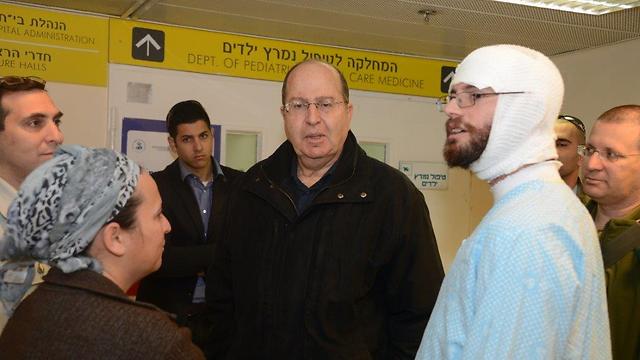
"They made us a Purim feast at the hospital and Avner, who had already been discharged, sent the four girls to his sister in Jerusalem. But on Friday morning we were told Ayla was being discharged home for Shabbat. I called the neighbor and told her we were on our way. When we got home, the table was covered with mountains of food. I had to find neighbors with big fridges who could freeze some of the food. I knew that even if we ate nonstop, we still wouldn't have finished it by Passover."
"They made me eat meat," Ayla complains.
"That's true," her mother confirms. "Her diet included meat, high-fat cheeses and ice cream."
"And I don't do meat," Ayla adds. "Not for conscientious reasons. I just don't like the taste of it."
After two months at the Department of Pediatrics, she started a five-month rehabilitation process. "There, you go back to regular life and you dress like regular people, not like patients. Every Sunday I got the weekly schedule divided into 45-minute activities: Physiotherapy, occupational therapy, you name it. In the classroom there, I learned computers. I played around with graphic design on PowerPoint. It's something I enjoy, I really like art."
On the last day of 6th grade, Ayla got special permission to attend the prom. "After the party, I loaded all of my schoolbooks on my sister Yiska," she says. "Poor thing, it broke her back, but you must not forget books."
Weren't you nervous of your friends seeing you with the pressure mask?
"No. It wasn't the first time they saw me. During the rehabilitation process, I went to all of the Bat Mitzvah parties of my classmates. Bat Mitzvah is an important event, I didn't want to miss it."
Hates shopping
Ayla was only 11.5 when the Molotov cocktail was thrown at the car she was traveling in, "and I had already planned my Bat Mitzvah. We thought about a trip to Jerusalem, with the cousins and five close friends. Seventy people altogether. Half a year after I was wounded, I celebrated my Bat Mitzvah with 700 guests on the grass in Ma'ale Shomron. We were happy to invite everyone who helped us."
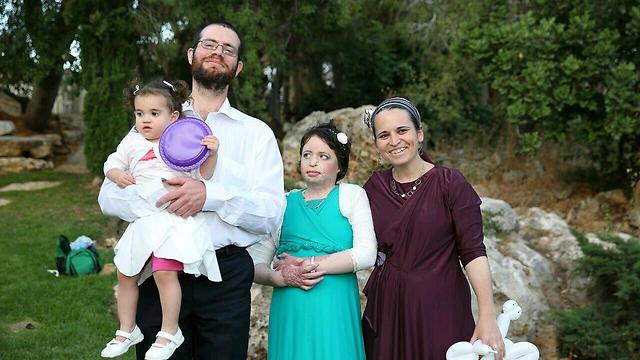
Six months ago, Ayla had another operation on her left hand, whose movements were impaired because of the scarring that caused her skin to shrink. "I couldn't move my thumb," she says, showing me how her movements have improved. "I had skin shrinking in my right hand as well. Do you think I need surgery?" she asks her mother.
"That's up to you," the mother responds.
"I think I'll give it a pass," Ayla contemplates aloud. "I'll settle for the operation on my ears. You see?" she sweeps her hair away. "I suffered from gangrene; parts of the ear fell off."
How long will you have to wear the pressure mask for?
"Until the scars stop growing," Ayla says. "There is no timetable for that, it happens at a different rate for each person. We'll know that it happened when the scars are no longer pink. At first, my entire face was red. The scars covered large areas. I can see it improving. I have a scar under my lower lip that's pulling it down. Over my upper lip I had a scar that drained the color from it."
"We hope to overcome the issue with the upper lip without surgery," the mother explains. "With a tattoo. We started treating the scar under the bottom lip with laser and we're hoping it'll be enough."
Ayla, how important is outward appearance to you?
"On a scale of one to ten?" she jokes, but evades giving a straight answer. "I was never too fussy about my outward appearance. As an 11.5-year-old girl, I just threw on whatever my hand first grasped. Give me a good book so I can climb up a tree and read. What difference does it make what I wear? As long as it's comfortable to me and modest, everything is good. Nowadays, I care more about how I look, but it's not because of the attack, but because I've grown older. At my age, I now realize it's not nice to be walking around with the kind of clothes you would wear to paint your house."
Her fingers brush her bottom lip. She does this every time she's contemplating something. "I can't tell you that 'I want to be beautiful,' because it means I'm currently not beautiful, and that's not true. Obviously, there are people far more beautiful than I—like my sister Yiska, who is absolutely perfect—but outward beauty is not everything in life."
Every morning at eight, she takes the school bus to the Zvia ulpana (religious girls' school) in the settlement of Revava and comes back home at 4pm. "I'm not allowed to be exposed to the sun, so I wear a hat along with the mask," she says. "In Israel, of all places, people stare at me a lot more than they do here in Brussels. Those looks, especially from children, are really annoying. What, do you really think I don't see you staring at me?"
Before the attack, didn't you ever stare at someone who looked unusual?
"I don't remember. I don't think so. I'm polite. If I did, then I looked away a second later so as to not embarrass the other person. But in Israel, there are a lot of rude children who look at me nonstop, as if I were a mannequin standing at a display window. If you're so curious about me, just ask me what happened to me, and you'll get an answer."
What do you do when people stare?
"Stare back. It's kind of a game."
Who will blink first?
"No, who will be the first one to look away. And I always win. You want to embarrass me? I'll embarrass you."
Her afternoons are busy. "I love to read, have I mentioned?" she jokes. "Once a week I take an advanced math class, and once a week I ride on my horse, Dvash (Honey), at the ranch in Kedumim. Riding helps my posture and increases my self-confidence."
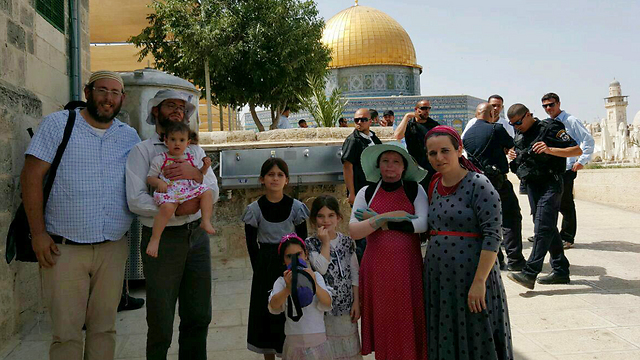
During school breaks, she attends camp for children who suffered burn injuries. "We only focus on our injury as what we have in common for the first few minutes. After that, I choose (to spend time with) those who interest me."
What are your plans for the future?
"I have yet to even pick my subjects for next year, so it's hard for me to think about the distant future. I suppose I'll do national service. I want to write, to be an author. I have a lot of sources of inspiration. And, of course, I'm dreaming of a family with as many children as possible. Maybe eight."
Do you still ask yourself why it happened to you?
"Who told you I did? Maybe at first. I believe everything happens for a reason. Whatever God chooses to do, it's for the best. Had that Molotov cocktail not been thrown at me, then someone else would have gotten hurt, and I don't know how other people would have dealt with this situation."
The day after her touching speech, Ayla's cellphone is still blowing up with messages. Israeli musicians Gad Elbaz and Ovadia Hamama sent her a song they wrote especially for her, but she asks us not to play it in the taxi on the way to the airport. It's embarrassing. Prime Minister Benjamin Netanyahu also gives her a call. "He told me my appearance was an important mission. To be honest, I couldn't hear half of what he said. Because of the bad reception, I didn't tell him what I think he should do."
What is that?
"I'm sick of people saying the terror attacks are crazy episodes carried out by lone wolves. We're in a state of war. They have funding, they have training camps from a young age, and we keep seeing this as lone wolf terrorism. You don't settle a war at court. When they fight us, we need to fight back by speaking their own language. But don't think I hate Arabs. My best friend during rehabilitation was an Arab girl."
Do you think you could have avoided that Molotov cocktail if you weren't living in the Samaria?
"No. These days, the only safe place in the world is the moon. Terror attacks happen all over the country, and the Samaria is actually a place where people have a long life expectancy. We hardly have any car accidents."
A change in ties
The intergroup inauguration ceremony ("None of the speakers talked about the West Bank, they all called the area by its name—Judea and Samaria," Dagan says with delight) also featured talk of the Boycott, Divestment, Sanctions (BDS) movement.
Nati Rom, who founded the Lev HaOlam organization, came with boxes of products made in Judea and Samaria, and all present raised a toast with wine from the Har Bracha Winery.
Moshe Lev-Ran, the production manager of a plastic factory in the Barkan Industrial Park, announced that peace will come from the economy. "I want to see smiling Palestinians. Every salary one of our Palestinian workers makes can feed 10-20 mouths, and if they have what to eat, they won't look for a living in murdering Jews."
Dagan wants to organize events of this nature in the United States as well, and is not embarrassed when I ask him if he's an Israeli ambassador for President Donald Trump.
"Three years ago, I analyzed our relationship with the United States and reached the conclusion that after the Obama era, something else will come," he explains. "Most Israelis supported the Democrats, while I dug my roots in the Republican Party. I hosted top officials from the Trump campaign in Israel and I was invited to his inauguration. I don't think Trump will be 'whipped' by our prime minister. He too will condemn Israel, and a lot. But unlike Obama, he's leaning more in favor of Israel. That is why this is our chance to push for more (settlement) construction and to use this to leverage our image in the world. My vision is to have sponsorship of the Foreign Ministry, to work together and cooperate."
Among the text messages Ayla gets, many tell her "you're a hero, you're brave."
Do you think so?
"I'm not a hero and I'm not brave. But all of the other options I may have had were blown out the window."
What do you mean?
"I didn't choose to be burned by the Molotov cocktail. I don't have full control of my life. But I try to control the life I've been leading since it happened."










